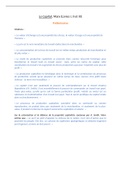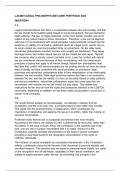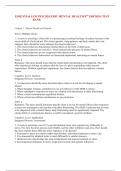WEEK 1: SETTING THE SCENE, FREEDOM OF ESTABLISHMENT AND TO PROVIDE SERVICES ................................. 2
Services and establishment................................................................................................................................ 2
WEEK 2: COMPETITION LAW .................................................................................................................................. 3
Art. 101 TFEU: cartel prohibition ....................................................................................................................... 3
WEEK 3: COMPETITION LAW .................................................................................................................................. 5
Art. 102 TFEU: abuse of a dominant position .................................................................................................... 5
WEEK 4: FREE MOVEMENT OF WORKERS............................................................................................................... 8
Free movement of workers: art. 45 TFEU, Regulation 492/2011 ...................................................................... 8
WEEK 5: EQUAL TREATMENT IN EMPLOYMENT ..................................................................................................... 9
Equal treatment in employment ........................................................................................................................ 9
WEEK 6: EUROPEAN CITIZENSHIP ......................................................................................................................... 11
Art. 21 TFEU: migrant others/non-economically active persons – right of residence/equal treatment ......... 11
Art. 20 TFEU: non-migrants – derived right of residence................................................................................. 11
Art. 20 TFEU: non-migrants – right to EU citizenship in itself (revoking citizenship) ....................................... 12
1
, WEEK 1: SETTING THE SCENE, FREEDOM OF ESTABLISHMENT AND TO PROVIDE SERVICES
Services and establishment
Step 1: does the situation fall under the scope of EU law?
• Personal scope
o Does the person have the nationality of an EU Member State?
o When it comes to a legal person (company): is the corporate seat located in an EU Member
State?
• Material scope
o Is there a cross-border element?
o Is there economic activity? à Are services provided for renumeration?
• Unlawful activities are excluded from the scope of application (Josemans para. 42)
Step 2: establishment or services?
• Establishment: participation on a stable and continuous basis (Gebhard para. 25)
• Services: temporary (Gebhard para. 25)
Step 3: legal framework?
• Establishment: art. 49 TFEU
• Services: art. 56 TFEU
• In case of art. 49 and 56 TFEU check whether the Services Directive is applicable
o Art. 1 SD: the Directive covers the freedom of establishment and the freedom to provide or
receive services
o Art. 2 SD: scope
Step 4: the nature of the restriction has to be determined
• Direct discrimination: measures/acts that are grounded on the forbidden criterion of nationality or
origin of goods, services, persons
• Indirect discrimination: measures/acts that apply a neutral criterion and that therefore apply without
distinction to all goods, services, persons, domestic and foreign, but its effect is that foreign goods,
services, persons are more heavily affected
• Restriction: measures/acts that are applicable without distinction to all goods, services and people,
domestic and foreign, but that make access to the market of another state more difficult or
inaccessible for foreign goods, services, people. Measures that are liable to hinder or make less
attractive the exercise of fundamental freedoms (Gebhard para. 37)
Step 5: are there justifications possible for that specific restriction?
• Treaty exceptions (direct and indirect discrimination + restrictions)
o Establishment: art. 51/52 TFEU
o Services: art. 62 in conjunction with art. 51/52 TFEU
• Rule of reason (indirect discrimination and restriction)
o Open ended list of reasons of public interest
o Gebhard para. 37
• If the Services Directive is applicable
o Establishment: check art. 9, 14 and 15 SD
o Services: check art. 16, 17 and 18 SD
Step 6: conditions for the Treaty exceptions and rule of reason exceptions
• No harmonization: the Treaty rules and rule of reason only apply when there is no harmonization
measure
• Public, non-economic interest
• Proportionality
o Suitability: is the measure suitable/appropriate for the goal that is trying to obtain?
o Necessity: are there other less restrictive measures that could be applied to obtain the goal?
2
, WEEK 2: COMPETITION LAW
Art. 101 TFEU: cartel prohibition
Step 1: are there undertakings involved? (at least 2)
• The concept of an undertaking is every entity engaged in an economic activity regardless of the legal
status of the entity and the way in which it is financed (Höfner & Elser)
• An economic activity is the offering of goods and services on the market (Ambulanz Glöckner), and
where that activity could, at least in principle, be carried on by a private undertaking for profit
(Pavlov) (there is no need to actually make a profit)
• An association of undertakings ‘consists of undertakings of the same general type and makes itself
responsible for representing and defending their common interests vis-à-vis other economic
operators, government bodies and the public in general’ (Wouters)
• Art. 101 does not apply to a single economic entity (parent – subsidiary relationship) (Viho)
o Test: does the parent exercise decisive influence over its subsidiary? (Akzo)
• Art. 101 does not apply to a relationship between a principal and his agent
Step 2: is there collusion between those undertakings?
• Each economic operator must determine independently the policy which it intends to adopt (Anic)
• There are three types of collusions
o Agreement: there must be a concurrence of wills between the parties (Bayer), the form of
the agreement is not relevant. Horizontal or vertical agreement?
o Concerted practice: coordination between undertakings which, without having reached the
stage where an agreement, properly so called, has been concluded, knowingly substitutes
practical cooperation between them for the risks of competition (Dyestuffs) à see also
Eturas UAB
§ But, is there a plausible explanation for parallel behavior? If so, then there is no
concerted practice (Woodpulp): art. 101 TFEU does not deprive economic operators
of the right to adapt themselves intelligently to the existing and anticipated conduct
of their competitors' (Woodpulp)
o Decision of an association of undertakings: common conduct adopted by members of an
association
Step 3: does this collusion have an appreciable effect on competition?
• Restriction by object (see art. 101(1)(a-e) (see also Beef Industry)
o Agreements have as their object the restriction of competition
o By their very nature injurious to the proper functioning of normal competition
o Conduct is presumed anti-competitive
o For example: horizontal agreements to fix prices, to share markets, to limit output, to
exchange information and vertical agreements to impose fixed of minimum resale prices, to
impose export bans
• Restriction by effect
o Where an agreement does not have as its object the restriction of competition, it is necessary
to prove its restrictive effect
o Need to assess agreement in its market context (Delimitis) à necessary to define the
relevant product and geographic market
o Need to establish a ‘counterfactual’ à compare the situation on the market with the
agreement to the situation on the market that would’ve existed without the agreement
• Restrictions by object: presumed to appreciably restrict competition (the de-minimis doctrine does
not apply here)
• Restrictions by effect: de minimis notice applies
o Horizontal agreement: combined market share held by the parties to the agreement does not
exceed 10% on any of the relevant markets affected by the agreement
o Vertical agreement: market share held by each of these parties to the agreement does not
exceed 15% on any of the relevant markets affected by the agreement
3
Services and establishment................................................................................................................................ 2
WEEK 2: COMPETITION LAW .................................................................................................................................. 3
Art. 101 TFEU: cartel prohibition ....................................................................................................................... 3
WEEK 3: COMPETITION LAW .................................................................................................................................. 5
Art. 102 TFEU: abuse of a dominant position .................................................................................................... 5
WEEK 4: FREE MOVEMENT OF WORKERS............................................................................................................... 8
Free movement of workers: art. 45 TFEU, Regulation 492/2011 ...................................................................... 8
WEEK 5: EQUAL TREATMENT IN EMPLOYMENT ..................................................................................................... 9
Equal treatment in employment ........................................................................................................................ 9
WEEK 6: EUROPEAN CITIZENSHIP ......................................................................................................................... 11
Art. 21 TFEU: migrant others/non-economically active persons – right of residence/equal treatment ......... 11
Art. 20 TFEU: non-migrants – derived right of residence................................................................................. 11
Art. 20 TFEU: non-migrants – right to EU citizenship in itself (revoking citizenship) ....................................... 12
1
, WEEK 1: SETTING THE SCENE, FREEDOM OF ESTABLISHMENT AND TO PROVIDE SERVICES
Services and establishment
Step 1: does the situation fall under the scope of EU law?
• Personal scope
o Does the person have the nationality of an EU Member State?
o When it comes to a legal person (company): is the corporate seat located in an EU Member
State?
• Material scope
o Is there a cross-border element?
o Is there economic activity? à Are services provided for renumeration?
• Unlawful activities are excluded from the scope of application (Josemans para. 42)
Step 2: establishment or services?
• Establishment: participation on a stable and continuous basis (Gebhard para. 25)
• Services: temporary (Gebhard para. 25)
Step 3: legal framework?
• Establishment: art. 49 TFEU
• Services: art. 56 TFEU
• In case of art. 49 and 56 TFEU check whether the Services Directive is applicable
o Art. 1 SD: the Directive covers the freedom of establishment and the freedom to provide or
receive services
o Art. 2 SD: scope
Step 4: the nature of the restriction has to be determined
• Direct discrimination: measures/acts that are grounded on the forbidden criterion of nationality or
origin of goods, services, persons
• Indirect discrimination: measures/acts that apply a neutral criterion and that therefore apply without
distinction to all goods, services, persons, domestic and foreign, but its effect is that foreign goods,
services, persons are more heavily affected
• Restriction: measures/acts that are applicable without distinction to all goods, services and people,
domestic and foreign, but that make access to the market of another state more difficult or
inaccessible for foreign goods, services, people. Measures that are liable to hinder or make less
attractive the exercise of fundamental freedoms (Gebhard para. 37)
Step 5: are there justifications possible for that specific restriction?
• Treaty exceptions (direct and indirect discrimination + restrictions)
o Establishment: art. 51/52 TFEU
o Services: art. 62 in conjunction with art. 51/52 TFEU
• Rule of reason (indirect discrimination and restriction)
o Open ended list of reasons of public interest
o Gebhard para. 37
• If the Services Directive is applicable
o Establishment: check art. 9, 14 and 15 SD
o Services: check art. 16, 17 and 18 SD
Step 6: conditions for the Treaty exceptions and rule of reason exceptions
• No harmonization: the Treaty rules and rule of reason only apply when there is no harmonization
measure
• Public, non-economic interest
• Proportionality
o Suitability: is the measure suitable/appropriate for the goal that is trying to obtain?
o Necessity: are there other less restrictive measures that could be applied to obtain the goal?
2
, WEEK 2: COMPETITION LAW
Art. 101 TFEU: cartel prohibition
Step 1: are there undertakings involved? (at least 2)
• The concept of an undertaking is every entity engaged in an economic activity regardless of the legal
status of the entity and the way in which it is financed (Höfner & Elser)
• An economic activity is the offering of goods and services on the market (Ambulanz Glöckner), and
where that activity could, at least in principle, be carried on by a private undertaking for profit
(Pavlov) (there is no need to actually make a profit)
• An association of undertakings ‘consists of undertakings of the same general type and makes itself
responsible for representing and defending their common interests vis-à-vis other economic
operators, government bodies and the public in general’ (Wouters)
• Art. 101 does not apply to a single economic entity (parent – subsidiary relationship) (Viho)
o Test: does the parent exercise decisive influence over its subsidiary? (Akzo)
• Art. 101 does not apply to a relationship between a principal and his agent
Step 2: is there collusion between those undertakings?
• Each economic operator must determine independently the policy which it intends to adopt (Anic)
• There are three types of collusions
o Agreement: there must be a concurrence of wills between the parties (Bayer), the form of
the agreement is not relevant. Horizontal or vertical agreement?
o Concerted practice: coordination between undertakings which, without having reached the
stage where an agreement, properly so called, has been concluded, knowingly substitutes
practical cooperation between them for the risks of competition (Dyestuffs) à see also
Eturas UAB
§ But, is there a plausible explanation for parallel behavior? If so, then there is no
concerted practice (Woodpulp): art. 101 TFEU does not deprive economic operators
of the right to adapt themselves intelligently to the existing and anticipated conduct
of their competitors' (Woodpulp)
o Decision of an association of undertakings: common conduct adopted by members of an
association
Step 3: does this collusion have an appreciable effect on competition?
• Restriction by object (see art. 101(1)(a-e) (see also Beef Industry)
o Agreements have as their object the restriction of competition
o By their very nature injurious to the proper functioning of normal competition
o Conduct is presumed anti-competitive
o For example: horizontal agreements to fix prices, to share markets, to limit output, to
exchange information and vertical agreements to impose fixed of minimum resale prices, to
impose export bans
• Restriction by effect
o Where an agreement does not have as its object the restriction of competition, it is necessary
to prove its restrictive effect
o Need to assess agreement in its market context (Delimitis) à necessary to define the
relevant product and geographic market
o Need to establish a ‘counterfactual’ à compare the situation on the market with the
agreement to the situation on the market that would’ve existed without the agreement
• Restrictions by object: presumed to appreciably restrict competition (the de-minimis doctrine does
not apply here)
• Restrictions by effect: de minimis notice applies
o Horizontal agreement: combined market share held by the parties to the agreement does not
exceed 10% on any of the relevant markets affected by the agreement
o Vertical agreement: market share held by each of these parties to the agreement does not
exceed 15% on any of the relevant markets affected by the agreement
3







